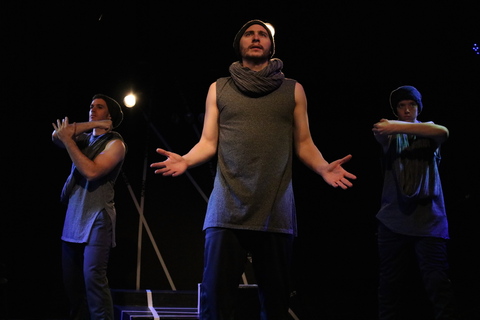Messenger #1, A New Ancient Greek Tragedy
Masterful adaptation of all three plays in Aeschylus’ Oresteia reinvents these Greek tragedies in colloquial terms for modern audiences.

Jordan Kaplan, J.C. Ernst and Emily Kitchens in a scene from “Messenger #1, A New Ancient Greek Tragedy” (Photo credit: Kristin Calabria)
[avatar user=”Victor Gluck” size=”96″ align=”left” ] Victor Gluck, Editor-in-Chief[/avatar]The plays of Aeschylus do not get performed a great deal, but that might change. Mark Jackson’s masterful Messenger #1, subtitled “A New Ancient Greek Tragedy,” adapts the three plays of Aeschylus’s Oresteia into one new powerful 90-minute play. Written in colloquial language, this makes the ancient story very accessible for a contemporary audience. First performed in San Francisco in 2000, Messenger #1 is now having its East Coast premiere.
What Jackson has accomplished is to reinvent these Greek tragedies in modern terms with six actors while remaining faithful to the original myths. At the same time, he avoids the drawbacks of early Greek theater which included long monologues, little or no dramatic interaction by the characters, and elaborate choral passages in difficult poetry. Hondo Weiss-Richmond’s all-Equity production for this inventive and stylized Hunger & Thirst Theatre presentation is fast-paced and riveting, making Greek tragedy both immediate and personal. Although the audience sits on three sides of the black box theater at The Paradise Factory, the set runs all around the venue making us part of the action. Along with occasional audience participation, the production pulls the viewer into the legendary story with its new take on the events.
Messenger #1 retells Aeschylus’ trilogy (Agamemnon, The Libation Bearers and The Eumenides) but goes beyond his boundaries both before and after his tragedies. Jackson’s play tells the story of the fall of the Greek Royal House of Atreus (the first dysfunctional family in drama?) from the sacrifice of Iphigenia, daughter of King Agamemnon and Queen Clytemnestra, through a series of revenges and reversals that lead to the intercession of the goddess Athena. In order to sail to Troy to recapture his brother’s wife Helen, Agamemnon of Mycenae discovers that he must kill his own daughter to appease the goddess Artemis (Diana). His wife Clytemnestra vows revenge on her husband when he returns. This sets up a cycle of killings and retribution. The end of the play suggests that once it starts it is never over.
In addition to the swiftness of the storytelling and the use of contemporary language, Jackson uses a sort of upstairs-downstairs approach. Aside from what is happening to the royals, we also see everything from the point of view of the three messengers. The messengers deliver their reports to us the populace, interact with each other, and interpret for us how the events of their world affect them. They also work as the chorus but each has something different to reveal rather than speaking in unison as in ancient Greek drama. Jackson has tweaked the legend somewhat which makes his version all the more surprising and absorbing.

J.C. Ernst and Emily Kitchens in a scene from “Messenger #1, A New Ancient Greek Tragedy” (Photo credit: Kristine Calabria)
Under Weiss-Richmond’s direction, the six-member cast demonstrates tremendous versatility with three of the actors playing a minimum of three roles in a short period of time, often exiting and returning as someone else. As the Messengers, J.C. Ernst, Jordan Kaplan and Emily Kitchens are extremely involving, making us care about their down-trodden lives as well as their fates. Messenger #1 travels with Agamemnon and survives to tell the tale. Messenger #2, his devoted friend, remains behind as a courier for the queen, while Messenger #3 is a woman in disguise and the beloved of Messenger #1 whom she awaits with bated breath. As they are dressed entirely alike in Heather Carey’s costume design, there are times when it is possible to confuse Messenger #1 (played by Ernst) and Messenger #2 (Kaplan) when they appear individually. It might have been better to have slightly different costumes or to have given each a distinguishing name.
Playing multiple roles, the rest of the cast could not be more different in each of their guises. Dan Morrison alternately plays the arrogant, swaggering King Agamemnon, his confused, troubled son Orestes, and the silent Executioner in a penultimate scene. Katie Consamus is the self-righteous Clytemnestra as well as the empathetic goddess Athena. She also appears as a doomed Trojan Maiden and a frightening member of the Furies. Natalie Hegg is a silently tragic Iphigenia, a blood-thirsty Electra, a doomed Trojan Maiden, and an even more sinister member of the Furies. The cast is riveting at all times playing these ancient roles as if the story were occurring today.
Ghazal Hassani’s stylized black and white unit set with moveable blocks and with netting around the walls for exits and entrances works remarkably well for all of the locales needed to tell the story. It resembles celebrated Parisian productions of Jean Cocteau’s modern adaptations of the Greek myths. Carey’s stylized costumes for the royals as well as the Furies make for a dramatic look, particularly against the dark setting. The lighting by Remy M. Leelike subtly leads the viewer to the section of the space being used for each scene. Randall Benichak’s sound design makes use of various styles of music and song that add atmosphere to the play.
As presented by Hunger & Thirst Theatre, Mark Jackson’s Messenger #1 is a modern adaptation of the Greek trilogy by Aeschylus which reinvents the tale for contemporary audiences. With a cast of six superb actors, Hondo Weiss-Richmond’s brisk and lucid production is both gripping and provocative and makes these old myths seem new again. It is a notable introduction to Greek drama for those unfamiliar with it, and a gift for those who have sat through stodgy, uninspired and tedious revivals in the past.
Messenger #1, A New Ancient Greek Tragedy (through March 18, 2017)
Hunger and Thirst Theatre
The Paradise Factory, 64 E. 4th Street, in Manhattan
For tickets, visit http://www.hungerandthirsttheatre.com
Running time: one hour and 40 minutes without an intermission






Leave a comment